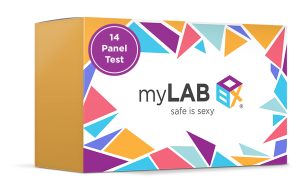How To Take An Anal Chlamydia Test At Home

Use An Anal Chlamydia Test From The Comfort of Home
Fortunately, ordering and using a three-site extragenital chlamydia test from home couldn’t be easier. Screening can happen at any time and from any place. Even better, it only takes five minutes to complete the testing process and collect a sample.
Here’s how it works:
- Order an STI testing kit (You even get free shipping!)
- Collect a sample using the easy-to-follow instructions.
- Send the sample off for testing. (More free shipping!)
- Receive your lab-certified results online in just days.
Symptoms of Chlamydia in the Rectum
With standard “genital chlamydia” there are a bunch of variable symptoms for men and women. Fortunately, everyone has a rectum. So, in this case, we’re all on equal ground. We’ll all need to use a rectal chlamydia test. These are the most common detectable signs of chlamydia in the rectum:
Anal chlamydia symptoms in women:
- Inflammation that causes rectal pain
- Anal discharge
- Rectal bleeding
- Lower abdominal pain, nausea, or a fever if the infection spreads
Anal chlamydia symptoms in men:
- Rectal pain due to inflammation
- Mucus discharge from the rectum
- Rectal bleeding
- Pain in the testes and scrotum area if the chlamydia infection spreads
It is important to note that you at a higher risk of getting or giving HIV, the virus that causes AIDS, if you have chlamydia and don’t get treated.
Are you able to recognize the symptoms of Chlamydia? Great, now how about the symptoms of rectal or oral chlamydia? That’s much trickier, right? A lot of people don’t even realize that they could be infected anywhere beyond the genital region. Bad news, though… you absolutely can be. In that case, you’ll need both a rectal chlamydia test and an oral one.
Chlamydia is one of the most insidious sexually transmitted infections, or STIs. It’s also one of the most common. Fortunately, it’s relatively easy to detect and treat. Of course, in order to truly know whether you have this infection you’ll want to learn the value of oral and rectal chlamydia tests.
If you engage in oral or anal sex, you’ll discover that a standard genital-only test doesn’t cut it. You see, that run-of-the-mill test will only screen your genitals. If you want to track infections in your mouth or rectum, this isn’t enough. You’ll also need an special test that goes above and beyond. By this, we’re talking about an oral and rectal chlamydia test. This is more simply known as “Extragenital Testing.”
How Do You Get Anal Chlamydia?
We all (hopefully) know that testing for common sexually transmitted infections is a critical step for maintaining good health. But when is an anal chlamydia test necessary? If you have engaged in oral or anal sex, you can contract chlamydia in the mouth or rectum. Unfortunately, a special test is required to diagnose oral and rectal chlamydia. To be completely sure of your status, an Extragenital, or “3-Site” test is recommended.
If you’ve engaged in anal sex with a man, you should get an anal chlamydia test. You should take an anal chlamydia test if someone with chlamydia performs oral sex on your anus or touches their mouth and then your anus. You can be infected with chlamydia even if he doesn’t ejaculate. That’s because the bacterial infection is spread in semen (cum), pre-cum and vaginal fluids. It’s easy for chlamydia to permeate the skin around the anus and your anal canal if you have unprotected anal sex.
Any exchange of bodily fluids with someone who has chlamydia and direct contact with your anus— mouth and finger action included—could cause a rectal chlamydia infection if they have this STI.
Women are more likely to get anal chlamydia if their partners don’t wear condoms during anal sex. Both parties might be looser with using condoms since they’re less concerned about pregnancy. Make sure your partner slips on a condom during any kind of sex. Using latex condoms is the best way to prevent getting anal chlamydia. When you’re transitioning from vaginal sex to anal sex, or vice versa, put a new condom on every time.
Women and Anal Chlamydia
Women should talk to their gynecologists or their primary care doctors since the symptoms aren’t always treated the same way across the board.
An untreated chlamydia infection can cause serious, permanent damage to a woman’s reproductive system. This can make it impossible for her to get pregnant. In addition, these untreated infections can lead to serious complications such as life-threatening pregnancy outside the womb, and long-term pelvic or abdominal pain.
What is Extragenital Chlamydia Testing?
An Extragenital test kit from myLAB Box screens all three possible areas of infection: the mouth, rectum and genitals. For obvious reasons, our extragenital test kits are often called three-site tests. On top of that, it also screens for both chlamydia and gonorrhea. Since these infections are often found together, testing for them both at once saves time and money.
Extragenital testing is available as an individual purchase or as part of myLAB Box’s Total Box. The Total Box is the most comprehensive at-home test kit, which tests for all of the most common STIs.
At this point, you’re probably wondering what symptoms indicate that you have chlamydia in the mouth or rectum. Below, we’ll tackle this question. That said, you should be aware that even when a person is infected, there is a still a significant possibility that there will not be any easily detectable visible signs. For this reason, regular testing is the key to a clean bill of health.
Symptoms of Chlamydia in the Mouth
Chlamydia throat is among the sneakiest of sexually transmitted infections. Often, symptoms of chlamydia in the mouth can be mistaken for something utterly ordinary. It can appear similar to common ailments such as a cold or the flu. The truth is, you’ll never quite know for sure if these are a sign of a sexually transmitted infection unless you screen yourself. If symptoms of chlamydia in the mouth are present, this is how they may appear:
- low-grade fever
- sore throat or throat infection
- swollen lymph nodes
Don’t Ignore Any Potential Symptoms
We mentioned earlier that a chlamydia infection may not show any symptoms. At times, some people may mistakenly believe that they only have a case of the common cold or even a sore throat.
However, it is important not the leave a potential chlamydia infection undiagnosed or untreated. In the long run, it can lead to more serious health complications. For example, it is possible for chlamydia to damage a woman’s reproductive system. When left untreated, the infection can spread to the fallopian tubes and ovaries. Sadly, this can eventually result in infertility.
As you can see, even if you have taken a chlamydia test, it is still well worthwhile to also use an oral or rectal chlamydia test. On the plus side, this infection is highly curable. A short treatment of antibiotics should clear it up in no time. The only hitch is that you need to test! So there you have it! Don’t stress, just test.
What If My Test Results are Positive?
If your rectal chlamydia test comes back positive, you might be freaking out. Luckily, myLAB Box provides resources for you to talk to. Their experts can provide guidance about the steps you need to take next.
A woman can talk to her Ob/Gyn or her primary care doctor. A man should talk to his general practitioner about treatment options.
Your doctor will probably prescribe antibiotic to get rid of the infection. Effective treatment for a rectal infection like rectal chlamydia is important for HIV control and shouldn’t be delayed.
Tell your partner that you have this STD so they take an anal chlamydia test, too. It’s easy to get re-infected with chlamydia—even you and your partner were treated—so make sure you take a rectal chlamydia test again in three months.
Test and then Re-Test for Anal Chlamydia
Get tested for this STI every three months; particularly if you’ve had more than one partner, or unprotected sex. You should get a rectal chlamydia test even if you’re in a committed relationship and both said you’re STI-free when you s
- . Patterns of Extragenital Chlamydia and Gonorrhea in Women and Men Who Have Sex with Men Reporting a History of Receptive Anal Intercourse. Sexually Transmitted Diseases. 2016.
- . The Natural History of Untreated Chlamydia trachomatis Infection in the Interval Between Screening and Returning for Treatment. Sexually Transmitted Diseases. 2008.
- . Diagnosis and Management of Uncomplicated Chlamydia trachomatis Infections in Adolescents and Adults: Summary of Evidence Reviewed for the 2010 Centers for Disease Control and Prevention Sexually Transmitted Diseases Treatment Guidelines. Clinical Infectious Diseases.. 2010.
Popular Tests

Total Box
14 Panel STD Test
In Stock – Free Shipping
$369 – $399
